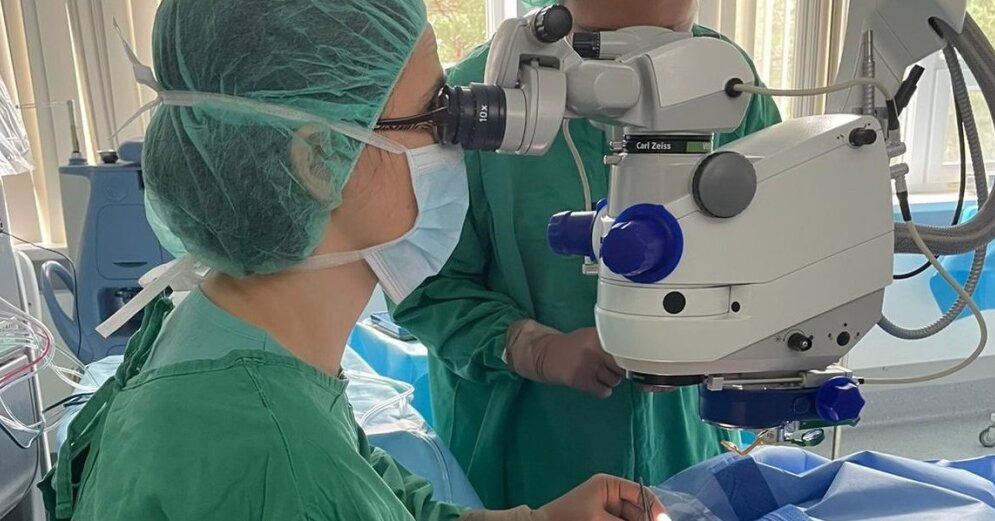In collaboration with the ophthalmologists of the Children’s Clinical University Hospital Eye Diseases Clinic and the Riga East Clinical University Hospital Ophthalmology Clinic, a unique eye operation was performed on a two-month-old baby with a rare congenital abnormal developmental abnormality – persistent fetal vasculature (PFV).
–
–
Content will continue after the ad
Advertising
–
Persistent fetal vasculature (PFV) is a rare genetically determined disease that is not usually inherited from parents and most often affects only one eye. As the head of the Ophthalmology Clinic of the Children’s Hospital, Ophthalmologist Sandra Valeiņa, explains, there is an embryonic vascular system in the baby’s acorns, which is completely absorbed until it is born. The task of the child’s eyelids is then to start learning to see. In the case of PFV, this process does not proceed as expected and connective tissue forms in the apple, which interferes with the further growth and development of the eye.
Depending on the severity of the disease, PFV can be treated with the aim of developing vision as far as possible, but in the case of more severe disease, the affected eye is severely impaired and may be blind. This is the first time that this type of operation has been performed in Latvia, and its primary goal was to ensure that light reaches the retina of the eye so that the child’s eye can grow. If the optic nerve and retina are functionally developed, a child with an affected eye could begin to learn to see.
Every year in Latvia, about 30 congenital cataract and glaucoma microsurgical surgeries are performed on children. They, in collaboration with the Children’s Hospital Eye diseases clinic specialists, performed by eye microsurgeons of Riga East Clinical University Hospital and Pauls Stradins Clinical University Hospital Ophthalmology Clinic. The pediatric ophthalmologist diagnoses the disease, prepares the patient for the necessary surgeries and monitors the state of the eye until the age of 18.
The patient was prepared for the first PFV operation in Latvia by specialists of the Children’s Hospital – treating doctor, ophthalmologist Sandra Valeiņa, anesthesiologist resuscitator Edgars Putka, intensive care and anesthesia nurse Sandija Šablovska, with the participation of resident doctor Laura Grava. The operation was performed by Līga Radecka, an ophthalmologist and vitreoretinal specialist at Riga East Hospital.
“We are pleased with the successful cooperation with the ophthalmologists of the Children’s Hospital and the opportunity to help the child with a rare congenital pathology. The extent and expected outcome of the eye defect was not clear before the operation, but says Līga Radecka, an ophthalmologist and ophthalmic microsurgeon at the Riga East Hospital Ophthalmology Clinic, who performed the said operation.
“Our mission is to improve the patient’s quality of life in every situation. Thanks to the cooperation of specialists from large Latvian hospitals, all Latvian children have access to strong competence of ophthalmic microsurgeons and operations with world-class medical equipment,” adds Sandra Valeiņa.
Surgery is only part of the treatment a child needs. Timely further rehabilitation is important, as a person’s visual functions develop during the first seven years of life, acquiring especially important skills during the first three years. For the next 18 years, the health of the baby’s eyes and the development of the affected eye will be monitored by the specialists of the Children’s Hospital.
–


